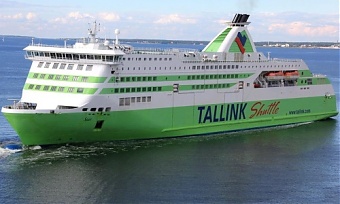Energy, Estonia, EU – Baltic States, Good for Business, Transport
International Internet Magazine. Baltic States news & analytics
Friday, 26.04.2024, 18:29
Estonia might become flag country for environment friendly ships
 Print version
Print version |
|---|
Tea Danilov, head of the Riigikogu Foresight Center, and Janno Jarve, senior analyst at the Centar center for research, observe in the blog of the Foresight Center that luring of shipowners to their registries has become a competitive activity for different countries, and states which have no maritime border have emerged among the major maritime nations of the world. As a result of this fight that has been going on for a long time, there were practically no cargo ships with a net tonnage of 500 tons or more left in the Estonian ship register by 2019, including ships owned by Estonian capital.
The study points out that the reflagging of a single ship to the Estonian flag may bring from 45,000 to 240,000 euros of tax revenue into the Estonian state budget from the onshore sector. How much, exactly, depends on how much shippers are interested in the products and services offered by the onshore sector of Estonia.
In the middle of this year, a reform took effect in Estonia that is aimed at increasing the numbers of cargo ships and passenger ships making regular trips beyond the European Economic Area in the Estonian ship register, increase demand for the services of onshore sector companies serving ships, and thereby to boost the Estonian economy and the tax revenue of the state budget.
In the impact assessment accompanying the corresponding draft legislation, it was estimated that 300 ships would reflag to Estonia.
With that in mind, the tax burden when it comes to labor taxes for seagoing personnel was eased significantly and a system of tonnage tax introduced, along with a dual-system bareboat chartered vessel register. Work is still underway on the digital applications of the registers, which are due to launch at the beginning of 2021, making the Estonian ship register service user-friendly and the payment of taxes convenient.
A comparison of the new Estonian arrangement with those of the successful flag countries such as Portugal (Madeira) and Malta reveals that while the charges for Ship Register I, meaning the register of ships belonging to legal persons registered in Estonia, are competitive, the charges for Ship Register II, meaning the register of ships belonging to owners not having a business seat in Estonia, are higher than those charged in Malta or Madeira.
A more important difference still is the preservation of the social tax and unemployment insurance tax obligation for seamen coming from outside the European Economic Area. It can be said based on interviews with shipowners that if they were to reflag their Madeira- or Maltese flagged ships to Estonia, said taxes would represent a significant additional cost. For the owner of a ship with 12 crew this would translate into an additional cost of circa 22,000 euros per year.
Although a digital register of high user convenience can be an advantage for Estonia, other countries are not sitting idly by either and there are friendly digital solutions available already. However, a digital signature service and a remote notarial attestation service available to residents and e-residents could be a competitive advantage for Estonia. In this way, the efforts of the flag country and the e-residency initiative could mutually support each other.
Looking further to the future, it makes sense to ask how Estonia as a flag country could benefit from development trends and create advantages which the current strong flag countries do not have yet, the study finds.
It points out that increased automation of ship control systems creates opportunities for reducing the size of ship crews. It's worthwhile for the Estonian ship register to be open to discussion over what technological solutions would enable to sail a ship also with smaller crew numbers than the minimum crew numbers required under current law. A crew smaller by two or three members would enable to save significantly more on costs per year than a minor reduction in register fees, according to the study.
The emphasis placed on environmental sustainability is growing in Europe and globally alike. The additional incentives offered for environment friendly ships could be balanced off and even surpassed by incomes earned through the reconstruction of ships to be more environment friendly happening at Estonian shipbuilding and ship repair companies, according to the study.
The realization of that goal would require bringing the efforts made in the field of flag country together with entrepreneurship and industrial policy measures.
The report compiled for the Foresight Center, titled "The Competitive Ability of a Flag Country," will be presented at a public sitting of the Riigikogu economic affairs committee that will start at 11 a.m. on Monday.
- 28.01.2022 BONO aims at a billion!
- 26.08.2021 LLC Dizozols Investments finalizes investment attraction deal with Crowdestor with record-high profits
- 13.02.2021 Моя жизнь в газете. Очерки по новейшей истории Латвии. Глава 1
- 30.12.2020 Накануне 25-летия Балтийский курс/The Baltic Course уходит с рынка деловых СМИ
- 30.12.2020 On the verge of its 25th anniversary, The Baltic Course leaves business media market
- 30.12.2020 Business Education Plus предлагает анонсы бизнес-обучений в январе-феврале 2021 года
- 30.12.2020 Hotels showing strong interest in providing self-isolation service
- 30.12.2020 EU to buy additional 100 mln doses of coronavirus vaccine
- 30.12.2020 ЕС закупит 100 млн. дополнительных доз вакцины Biontech и Pfizer
- 29.12.2020 Latvia to impose curfew, state of emergency to be extended until February 7








 «The Baltic Course» Is Sold and Stays in Business!
«The Baltic Course» Is Sold and Stays in Business!

